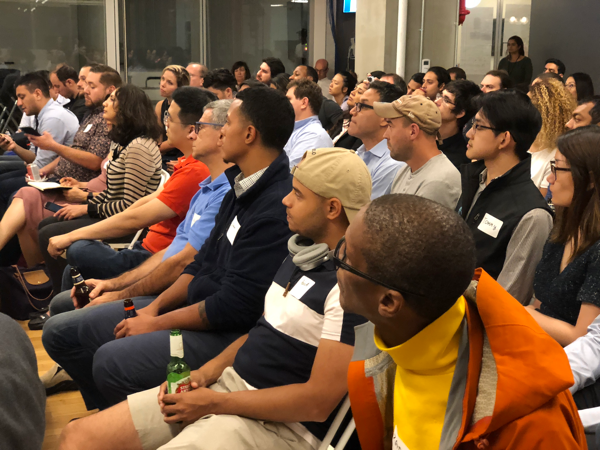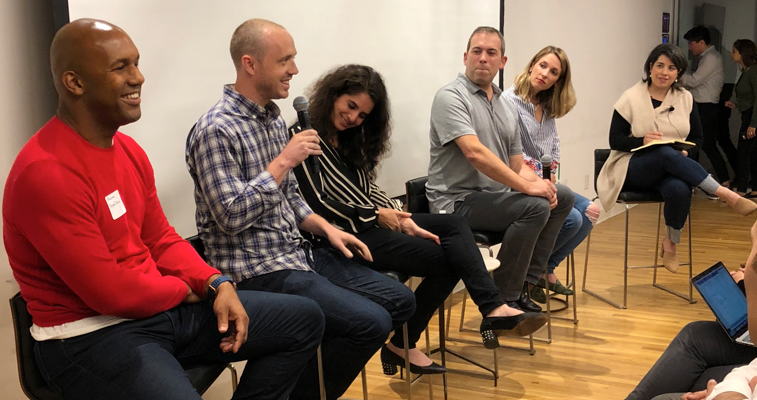As someone who has organized and helped promote many events in the past, I have a strong appreciation and admiration for what Amanda Moskowitz and Danny Garcia at Stacklist are doing with their ongoing event series.
They have organized over 40 high-quality events with experienced panelists that hit on relevant topics across the spectrum for building a startup. It’s everything from raising capital to product management topics to customer acquisition strategies.
We sponsored last Thursday’s event, so I had a chance to experience a Stacklist event first hand. The topic - Building a Platform: An Inside Look at Marketplace Startups - was very relevant, since VentureFizz is ultimately a marketplace connecting amazing talent with equally amazing companies in the tech scene.
The panelists for this event included (from left to right in the photo above): Kalam Dennis (Co-founder of AptDeco), Alex Larsen (COO of Roomi), Basha Frost Rubin (CEO and Co-Founder of Priori), Yaron Galai (Co-Founder and Chief Executive Officer at Outbrain), Caroline Hofmann (COO of Republic) and Amanda Moskowitz (Founder and CEO at Stacklist) as the moderator.
Building a marketplace is very challenging because you have to add value to not just one customer, but two sets of customers. Here are four key takeaways to help you further your chance for success.
Chicken or the Egg
A common struggle for most marketplaces is getting it going. As you are building something from scratch, you are faced with a dilemma. Do you focus on building your demand first or supply? Ultimately, you are going to need both to be successful.
Alex Larsen of Roomi, a marketplace for finding roommates that has raised $17M in funding, emphasized that the challenge for their business has always been with the supply. The demand will follow if you are doing things better than the competition.

Yaron Galai of Outbrain advised the audience to figure out what is the “lead” for the marketplace by sharing two examples. Amazon and eBay are similar in that they both have a platform for selling items, except each one has a different approach or he as put it, “DNA.” eBay is catering towards the sellers by making the platform easy to sell items, whereas Amazon is focused on the buyer by giving them endless choices.
Be Scrappy
In order to get your marketplace going, sometimes you need to be scrappy and figure out creative ways to build your supply. A common hack here was scrapping other platforms, like Craig’s List, but providing a superior level of service.
Kalam Dennis of AptDeco, a used furniture marketplace, shared an example of how this tactic ended up being an opportunity to interact with sellers to understand their pain points and use that feedback to nail their approach and figure out how they differentiate from competitors.
Try to Keep it Simple, Especially at First
If possible, test out your marketplace by keeping it simple. Basha Rubin of Priori, a legal talent platform for corporate counsel, wishes she started out with a form on a single page website to test out the hypothesis of her business.
Rubin admitted that initially, she spent too much time perfecting the business plan and website. It was a hard lesson, as her business originally was focused on working with SMBs, but that market didn’t prove to be scalable. She had to transition her marketplace to focus on larger companies. Looking back, a simple form would have helped her figure which type of customer she should focus on in terms of building a business where the economics make sense.
Figure Out Your Differentiator and Double Down
There’s lots of competitor in any industry. It is important to understand your customer and figure out your key differentiator. Once that is determined, figure out how to work this into your messaging and double down on it.
Larsen from Roomi shared how the company spent time talking to buyers and sellers and ultimately discovered that it was Roomi’s focus on safety that was the differentiator. Roomi requires ID verification and they review every listing. This differentiator was incorporated into their messaging and it really helped them gain customers as there was a high level of trust versus alternatives like Craig’s List.
VentureFizz is sponsoring another Stacklist in October, so stay tuned for all the details soon!
Keith Cline is the Founder of VentureFizz. Follow him on Twitter: @kcline6.

